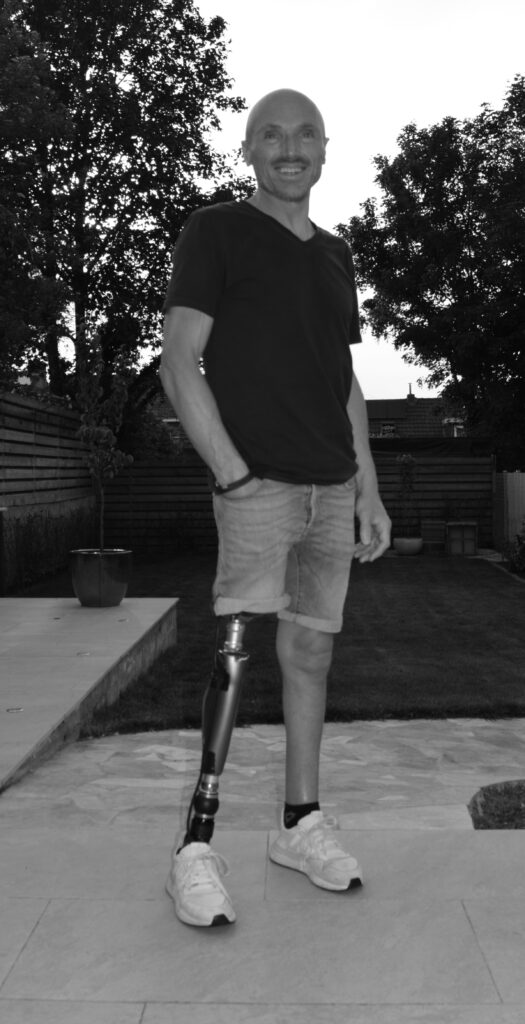Technologie speelt een grote rol in mijn leven. Ik heb namelijk het Complex Regionaal Pijn Syndroom (CRPS) type II, een uiterst zeldzame chronische pijnaandoening. Na jarenlange klachten aan mijn linkerbeen ontstond er in 2003 na een klein trauma ook pijn in mijn rechterbeen. Uiteindelijk namen de klachten dermate toe dat in 2018 mijn rechterbeen tot boven de knie is geamputeerd. Momenteel maak ik gebruik van een Auto Adaptive Knee Prothese, een elektronisch gestuurd hydraulisch kniesysteem. In de afgelopen jaren, en nog steeds, kwam ik vanwege mijn complexe casus veelvuldig in aanraking met de zorg. De zorg in Nederland is van hoge kwaliteit, maar in mijn ogen is er nog een wereld te winnen met het gebruik van moderne technologie.
The potential of modern technology in interpersonal communication
The world is becoming more digital, but the digitalisation of healthcare is still in an early stage. Take interpersonal communication as an example. Many healthcare professionals are involved in my case, from rehabilitation specialist to pain specialist to physiotherapist. Healthcare professionals that often work in different locations in the Netherlands, but all have important input during consultations. To my amazement, it is customary to hold these multidisciplinary consultations (MDCs) with all parties physically present. You will understand that this makes planning appointments difficult, and takes a lot of time. Holding MDCs via video calls would provide a solution to save these busy healthcare professionals time. Besides, I as a patient could also join in digitally to shed light on my perspective. Video consultations can also be valuable for individual appointments. After all, in my case it’s not always easy to leave the house for an, often relatively short, appointment.
What I also noticed is that many letters are exchanged between healthcare professionals about my case. At the same time, I had little insight into the data being exchanged about my case. This opacity sometimes made me feel powerless as a patient. I see a lot of potential in a personal health record (PHR), in which all the information about my case is kept and made available in a transparent way to all the different healthcare professionals involved. I would control my own data and can take the lead in my own healthcare process. And by collecting data in advance or filling out questionnaires online, I the patient can also contribute to decreasing the administrative pressure on my healthcare professionals. Double actions can be prevented and together were can make the healthcare more efficient.
Put the need at the centre, instead of the technological possibilities
The mountain of technological possibilities is growing exponentially, and the role of technology in the daily healthcare process will only get bigger. At the same time, we need to ensure that we stay critical of the added value of that technology. What is in line with the patient’s needs? Now, the focus is on the technological possibilities, and the question of what I want to do, as a patient, is not asked often enough. Is it necessary, for example, to create an expensive and advanced electric prosthesis for a patient who only walks minimal distances? Or can someone like that also function with, for example, a hydraulic knee? At the same time I see examples in which an advanced knee prosthesis is not granted because of the costs, when the ‘profit’ for the patient and society could be huge (because that person can go back to work, for example). It’s good to keep looking at the person behind the patient, and their needs. Using modern technology, we can also create space for this with healthcare professionals. It’s important that (future) healthcare professionals reflect on this more explicitly, even during their training.
I am definitely aware of the discussion surrounding privacy that arises with the use of such technologies. I myself am open to the use of advanced technologies and the growing datasets in healthcare. Of course we should attempt to ensure privacy as much as possible, but I value good healthcare above possible privacy risks.
Modern technologies have the potential to make healthcare more efficient and people-oriented. I, as a patient, am definitely open to them in order to maintain the quality, accessibility and affordability of healthcare!


